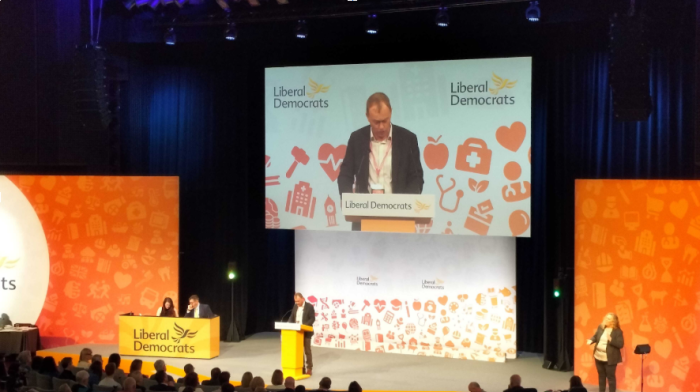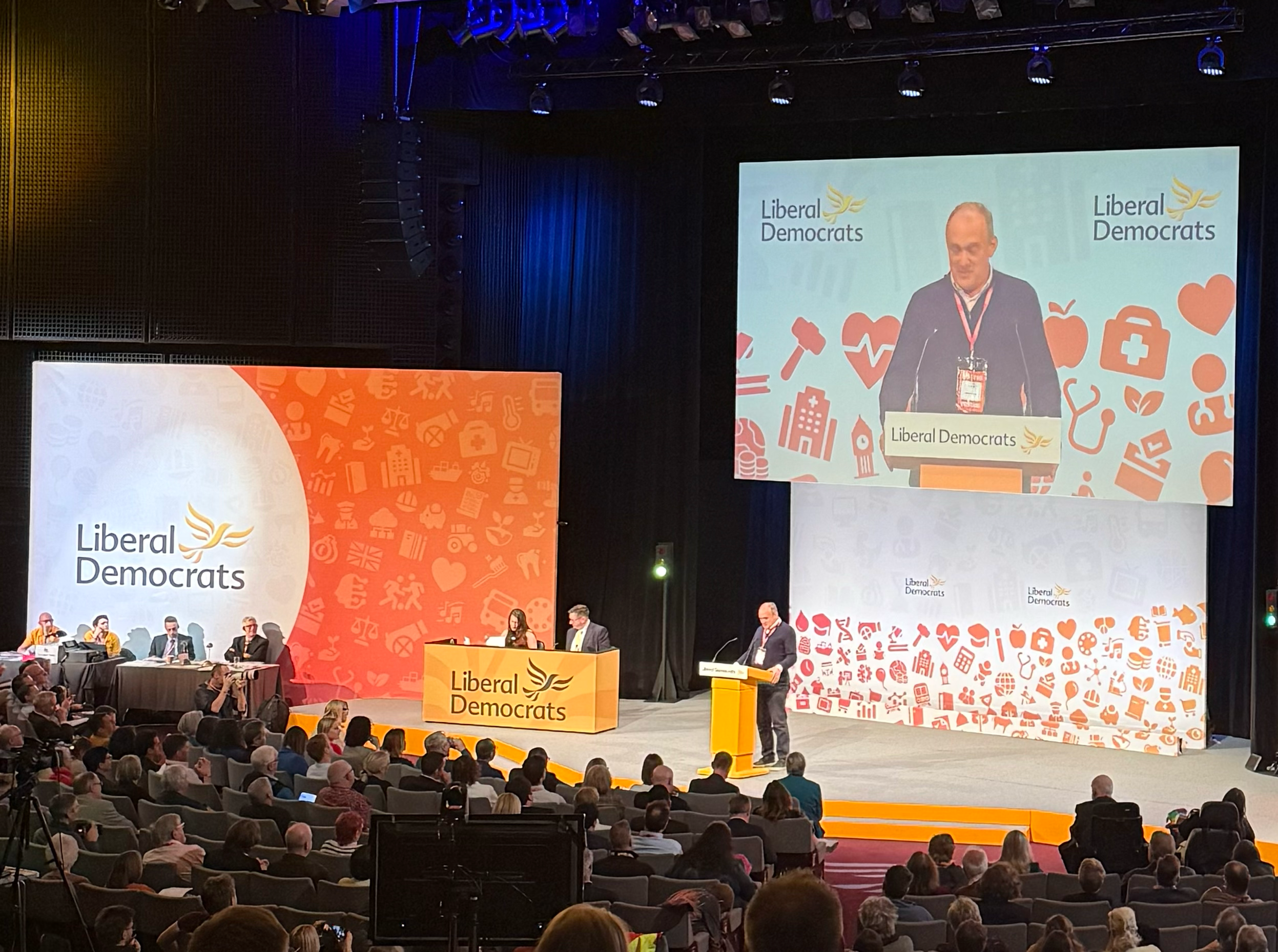The first indication that this was going to be a big event was when I was told in a meeting on Friday night that another guest’s social media feed was full of Lib Dems descending on Harrogate. When I got there the next day, it was clear he was right.
This was the first northern Conference for the Lib Dems since the general election last year and, with an unpopular Labour government, Kemi Badenoch struggling to land a blow, and their highest-ever tally of MPs, the party was in a bullish mood. With all the hustle and bustle of organising one, even Labour and the Tories bawk at the fact the Lib Dems hold two of these a year – one in the North and one in the South.
For the most part, a party conference is very much procedural but intellectually stimulating. It’s a series of Politics lectures away from campus.
Unusually, as political parties go, the Lib Dems are a federal party -unlike Labour and the Conservatives, they have divisions for all of England, Wales, and Scotland. This was a federal conference too – all the party’s big guns arrived throughout Saturday, from leader Sir Ed Davey to Jennie, the guide dog who sits on the Opposition frontbench.
Outside of the main Conference hall there was a suite of party groupings presenting themselves, almost like a Freshers’ fair. What struck us all most, however, was how friendly the atmosphere was. Everyone seemed to know everyone else, stopping for chats – be that an MP, a party leader, or a normal party member. It felt collaborative – sitting down for a coffee with another local party leader to exchange campaigning know-how was quite normal. Attendees addressing Conference for the first time got a round of applause whenever they brought it up.
The conference included speakers from all sectors, including Helen Morgan, the Health and Social Care spokesperson, who wanted to start “taking on Labour”. She called Wes Streeting axing mental health targets “cruel”, and called on the party to “fix” the issues plaguing social care.
Of particular concern in the morning was a motion to give more representation to the LGBTQ+ community. The speakers against the motion were particularly provocative – “I support LGB, but not T” being one line – and were against the clear view of the audience, making for an atmosphere that made the party seem more divided than it was. The motion passed nonetheless.

The day’s great matter was the F10 motion, which would take the power to select parliamentary candidates from local party associations and hand it to a federal committee. Former leader Tim Farron supported the F10 motion with a speech almost reminiscent of Bernie Sanders’ energy. The motion was controversial throughout the day – both sides offered me stickers, which both sides wore throughout the day, not realising I was merely a press member. As summator Paul Farthing quipped, “It proves Liberal Democrats have red-blooded passion when it comes to the Constitution.” When it came down to the crunch vote, it passed comfortably, providing quite the anti-climax.
After the fever of the F10 debate, a Q&A with Sir Ed Davey himself came up. Rather than that debate, in which he was rooted to the podium, now the leader could step away and own the stage for himself. He alluded plenty of times to his animated general election campaign last year (though there was a general feeling among party members that it was a campaign that would only work once). Nonetheless, he’s a charismatic and engaging speaker when he gets going. Responding to a question on government cuts to PIP benefits, he could work the crowd: “we will all stand up for [the disabled], yes?”.
He called Labour “all stick and no carrot”, saying the Lib Dems would need to be “standing up for the little people, who have no voice.” On the subject of mental health, he praised that his party are the only party to have a spokesperson with that as their sole brief.
Clearly his own niche, meanwhile, was foreign policy. With a debate on the subject forthcoming, he set the agenda of it: “I am really proud that we are the ones calling out President Trump. He uses the propaganda sheets from the Kremlin! It’s astonishing.
“We are going to make the case for greater working co-operation with our European partners. There’s no other party that can do it in the way that we can.”
He offered this comment on the USA: “It’s moving from a democracy – with flaws, of course, but a strong democracy – to an authoritarian state.” He said that “[moderate Republicans] are scared, they’re cowering – they saw what happened to Mike Pence.” He then turned to Reform. “My argument is that we are the antidote to right-wing populism.
“We as Liberals have a responsibility… we shouldn’t be complacent about Farage – he wants to divide people.” He continued, “Reform want the Republicans and Trump in the UK. They want to privatise our NHS – to basically do Trump’s bidding here… He’s not a radical reformer – he’s betraying what Britain stands for.”
On the question of “What’s the biggest lesson you’ve learned from Kamala Harris’ loss to Donald Trump?”, he responded: “Win, is the first one.”
Perhaps slightly too blunt, however he remedied it by proving that, much like ourselves at York Vision, he had paid slightly too much attention to the US election than was perhaps good for him.
On the subject of the Lib Dems’ relationship with Europe, he said “We need to have a new customs union with our European partners.” The Conference vote enshrined it as Liberal Democrat policy to have one in place by 2030. Sir Davey called Boris Johnson’s Brexit deal “a disaster”. “What’s sad is that Europeans don’t trust us anymore.”
Next up on the Saturday was a foreign policy debate about the Lib Dems’ response to Donald Trump. The Liberal Democrats’ Foreign Policy spokesperson, Calum Miller, said: “We must meet strength with strength while rejecting the logic that might equals right.” He called Trump’s “ambush” of Volodymyr Zelenskyy at the White House “the most shameful event to have ever taken place at the Oval Office”. Conference resolved to raise defence spending to 2.5% of GDP via an increase on the digital services tax to 10%.
Afterwards I spoke to Danish TV 2 political commentator Hans-Christian Andersen, for whom the defence spending raise was more than just a fairy tale. He told me it was time for a “new approach” to Britain’s defence opportunities, but nonetheless suggested that, by not being one of the two larger parties, the Lib Dems could “steer clear” of the major debates. “Being the Lib Dems is about expressing whatever we are.”
The party’s North East Policy Chair Abrial Jerram, a Biology and Chemistry student at Durham, was a frequent speaker. When I caught up with him later to ask how he manages both, he told me it was tough, as there were a lot of positions in the party particularly in the North East, but with few people to fill them.
The day was rounded off with more fringe events, and a singalong from the Liberator songbook. At the home of Eurovision 1982, as speakers didn’t neglect to mention, a Saturday night song festival certainly wouldn’t have gone amiss. Tomorrow – the leader’s speech, and the chance to set the path for this year’s local elections.
